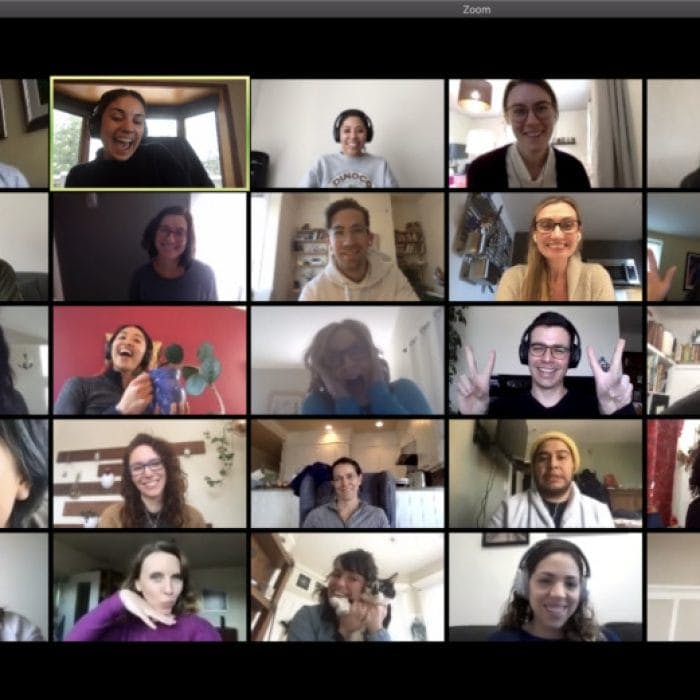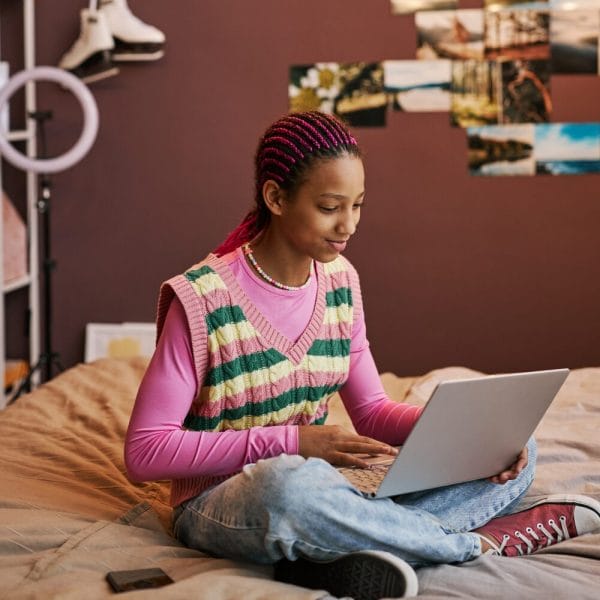According to Mental Health America, “nearly 1 in 5 American adults will have a diagnosable mental health condition in any given year” and “46% of Americans will meet the criteria for a diagnosable mental health condition some time in their life, and half of those people will develop conditions by the age of 14.” This month we celebrate Mental Health Awareness Month, and with shelter-in-place, well, in place, it may be hard to stay focused on anything positive right now. Whether you’re focused on taking care of yourself or looking to do something nice for a loved one, there are many ways you can take part in celebrating mental health awareness month. You can sign up to be a Crisis Text Line Counselor or spread important resources on your social media, and encourage and remind people that they are not alone by reaching out.
We called upon our favorite mental health allies–our staff and young adult advisory council, to share how they are taking care of their mental health (hint: it includes a TON of walking), and hope they provide you with some inspiration you can share with your community:
“The challenging thing about working from home for me is figuring out how to end my day in a really intentional way. I often work out of my kitchen—the epicenter of my house—so the workday closure is often forced as I HAVE to put away my computer and notes to begin dinner prep. That’s a good thing, for sure, but doing something extra to signify the end of the day is also really important. I’ve started lighting a candle or turning on the diffuser; changing the scent in my apartment is one way to say to my brain, ‘It’s time to turn off the workday and turn on family time.’ This intentional act helps turn off my work brain and helps me relax and be more present with my family.”
– Robin Raskob, Senior Manager of Marketing and Communications
“Evening walks have been the main thing keeping me going lately. I don’t have any outdoor space at my apartment so all day I look forward to that moment when I am finally not staring at a screen, can listen to a podcast or music, and walk away from the busier streets.”
– Lillian Tran, Young Adult Advisory Council Member + Design Research Intern
“Take my dog for a walk in the morning to start the day fresh and enjoy a peaceful start to the morning.”
– Dan Cawley, Chief Operating Officer
“There are several things that come together to support my mental health:
1) Running with my dog, Parker-Posey. Each morning we do one mile and then sprints. Sprints are his new playtime…lots of chasing and leaping!
2) Baking. Never really got into it before, but each weekend I am tackling a complex recipe. It’s so focusing, and you are rewarded with something delicious afterward. 3) Routine routine routine! Keeps me grounded and focused, and sets up my body and mind with expectations.”
– Chris McCarthy, VP of Strategy and Design
“Slow walks without my phone, frozen cookie dough at the ready, dreaming about the first road trip I’ll take after all this is over!”
– Janise Chan, Design Researcher
“I like to make myself ginger-lemon tea, envelop myself in soft plush blankets, slather my face with argan oil, and listen to groovy music.”
– Ashlyn Gary, Research Intern
“I don’t think I separately address my mental health from my physical health and overall well-being—it’s a complete package! To the best of my ability, I make sure I (a) get enough sleep, (b) exercise nearly every day, (c) work on things that are meaningful to me, and (d) stay connected with the people that matter most in my life.”
– Brian Rodriguez, Director of People and Culture
“Daily, just after dawn when the world is perfectly still and just waking up, morning walks. Where I stop to smell all the flowers, and let my mind wander about the architecture and history of the buildings and homes I see.”
– Monique Jaquez, Office Manager
“Pay attention to what I’m grateful for. I reflect each day on three things that brought me joy, hope. Deepen connections with those I love through conversations, storytelling and shared experiences. Try to reframe challenges or negative events as opportunities. Remind myself about what is most important in my life and try to live in accordance with those core values.”
– Fred Dillon, Senior Director of Strategy and Design
“Boundaries. If “it” or “they” are making things harder, whatever. It or they don’t need to be in my orbit. This helps me clear space for what I need to tackle vs. wasting energy on what does not serve me.”
– Cynthia Bazan, ILN
“I’ve been focusing on my values and trying to act in ways that are aligned. I bring this up because if I based what I do on my mood alone I think I would be worse off. It’s a time to be intentionally conscious about all of our actions and choices. Each time I finish something I try to take a moment and think about what matters right now and use that to inform my actions. Is it checking in on a family member? Taking a movement break? Eating something nourishing? Celebrating a small win?”
– Caroline Fitzgerald, Project Lead
“Monthly sessions with my therapist, sticking to daily routines, talking to friends!”
– Michaela Chai, Young Adult Advisory Council Member
“Regular exercise, walking with ONLY my dog (getting some space from my children is essential when we’re quarantining, even though I love them), and giving myself some breathing room if I notice that I’m having a bad day. It’s important to tell myself ‘it’s ok to have a hard day’ and ‘this will pass.'”
– Dr. Danielle Ramo, Senior Director of Research
“I try to meditate when I’m not feeling so well and I surround myself with people that make me happy.”
-Piumi Yaggahahewage, Young Adult Advisory Council Member
“For me, I try to just listen to my body and go with the flow. Quarantine has really challenged my sense of routine, so instead of fighting that, I try to move with it. Do I need to lay down and rest? Do I need to blast Kehlani’s new album, light a candle and dance around my apartment? What is going to serve me at this moment? Listening to that answer and doing that action, and then refocusing and asking myself, ‘okay, what’s next?’ is how I am keeping myself accountable and taking control of my mental health. I am also reminding myself that it’s okay to feel all the feels right now. We’re in a completely unprecedented time, tears are okay!”
– Maria Santana, Senior Marketing and Communications Associate





